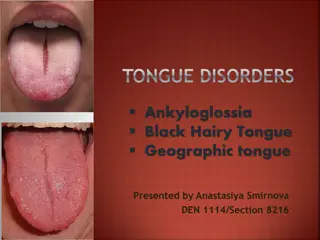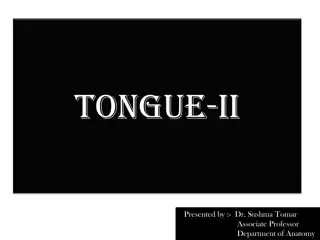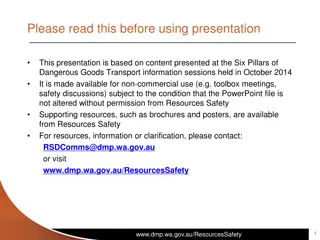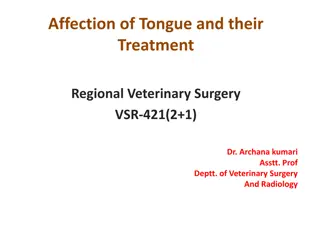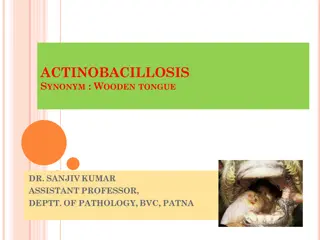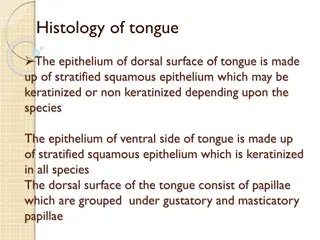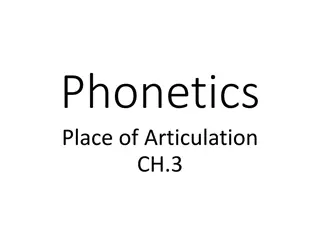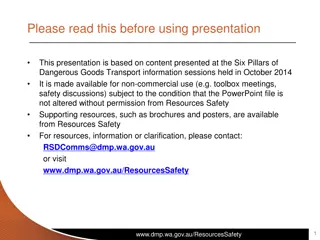Is Caviar Tongue Dangerous
Caviar tongue is an unharmful condition, appearing as a black hairy tongue on the undersurface of the tongue, which is caused by the aging factor in most individuals.
Download Presentation

Please find below an Image/Link to download the presentation.
The content on the website is provided AS IS for your information and personal use only. It may not be sold, licensed, or shared on other websites without obtaining consent from the author. Download presentation by click this link. If you encounter any issues during the download, it is possible that the publisher has removed the file from their server.
E N D
Presentation Transcript
Is Caviar Tongue Is Caviar Tongue Dangerous Dangerous
Caviar Tongue Caviar Tongue Caviar Tongue Caviar tongue is a temporary oral condition characterized by a black or dark brown discoloration on the underside of the tongue. It affects more than 10% of individuals over the age of 40 and is often mistaken for a serious issue due to its alarming appearance. Despite its intimidating name, caviar tongue is generally harmless and primarily results from the elongation and staining of tiny hair-like projections called filiform papillae, which can trap debris and bacteria. filiform papillae
Caviar Tongue Causes Caviar Tongue Causes Poor Oral Hygiene Poor Oral Hygiene Smoking or Tobacco Use Smoking or Tobacco Use Excessive Alcohol Consumption Excessive Alcohol Consumption stain the tongue Neglecting regular cleaning of the tongue can lead to the buildup of bacteria and debris, contributing to discoloration and the appearance of caviar tongue. Tobacco products can stain the tongue and reduce saliva production, increasing the likelihood of caviar tongue due to dry mouth. Alcohol dehydrates the body and reduces saliva, creating an environment conducive to bacterial overgrowth on the tongue. Certain Medications Certain Medications Vitamin Deficiencies Vitamin Deficiencies Chronic Liver Disease Chronic Liver Disease Medications like antibiotics or those containing bismuth can disrupt oral bacteria balance, potentially leading to caviar tongue. Deficiencies in B vitamins, particularly B12 and folate, can negatively affect oral health and contribute to the development of caviar tongue. Individuals with liver disease may experience changes in oral health, including caviar tongue, due to dehydration and immune system compromise.
Symptoms of Caviar Tongue Symptoms of Caviar Tongue Visual Appearance Visual Appearance Textural Changes Textural Changes Caviar tongue typically presents as a dark brown or black discoloration on the undersurface of the tongue, characterized by elongated papillae. The surface of the tongue may feel fuzzy or hairy due to the overgrowth of filiform papillae, trapping food particles and bacteria. Altered Taste Sensation Altered Taste Sensation Bad Breath Bad Breath Some individuals may experience an altered taste sensation, where flavors may seem muted or different than usual. Caviar tongue can lead to halitosis, resulting from bacterial buildup in the elongated papillae.
Identifying Caviar Identifying Caviar Tongue Tongue Visual Characteristics Visual Characteristics Texture Changes Texture Changes Color of Veins Color of Veins Caviar tongue is characterized by a black or dark brown discoloration on the top surface of the tongue, often resembling caviar due to its unusual appearance. The tongue may have tiny elongated bumps, creating a rough or hairy texture that can feel fuzzy to the touch. Dark purple or black veins may be visible underneath the tongue, resulting from the dilated and tortuous blood vessels associated with the condition.
Treatment Treatment Options Options Aesthetic Treatments for Caviar Tongue Aesthetic Treatments for Caviar Tongue Laser treatment can effectively reduce the appearance of caviar tongue by targeting discolored papillae. Sclerotherapy involves injecting a solution to shrink affected veins and improve aesthetic appearance. Both treatments are typically considered for individuals concerned about the cosmetic impact of caviar tongue. Consultation with a dental professional is essential to determine the appropriate treatment option. Managing Symptoms and Prevention Managing Symptoms and Prevention Improving oral hygiene can help alleviate symptoms and prevent further discoloration. Staying hydrated and reducing tobacco and alcohol use can improve overall oral health. Regular dental check-ups can help monitor and manage conditions like caviar tongue. Understanding the benign nature of caviar tongue may reduce anxiety about its appearance.
FAQs on Caviar Tongue FAQs on Caviar Tongue Caviar tongue is a benign condition that persists with aging and does not go away naturally. It is commonly seen in individuals over 40 years of age and can increase in frequency with age. Dr. P.Senthilkumar M.D.S. Dr. Dr. P.Senthilkumar P.Senthilkumar M.D.S. M.D.S. While caviar tongue can be unsightly and lead to discomfort due to altered taste sensations or bad breath, it is generally considered harmless and temporary. Rarely does it lead to serious complications, but persistent cases should be evaluated by a healthcare professional. bad breath Oral Health Expert
Prevention Tips Prevention Tips Tips for Preventing Caviar Tongue Tips for Preventing Caviar Tongue Maintain regular oral hygiene by brushing your teeth and tongue twice daily to reduce bacteria buildup and prevent discoloration. Stay hydrated by drinking plenty of water to promote saliva production, which helps wash away food particles and bacteria. Avoid tobacco products and excessive alcohol consumption, as these can contribute to tongue discoloration and oral health issues. Incorporate a balanced diet rich in vitamins, especially B vitamins, to support overall oral health and prevent deficiencies. Visit your dentist regularly for check-ups and professional cleanings to ensure optimal oral health and address any concerns promptly.
Conclusion and Conclusion and Takeaway Takeaway Caviar tongue is a common and generally harmless condition that affects many individuals, particularly those over 40 years of age. It is characterized by a temporary discoloration of the tongue, primarily caused by aging, poor oral hygiene, and other lifestyle factors. While caviar tongue may lead to cosmetic concerns or mild discomfort, it rarely results in serious health complications. Maintaining good oral hygiene and consulting a healthcare professional for persistent cases can help manage any concerns regarding caviar tongue.
T Thank You! hank You! https://www.suryadentalcare.com/ https://twitter.com/CareSurya https://www.facebook.com/suryadentaltrichy https://www.instagram.com/suryadentalsenthil/


